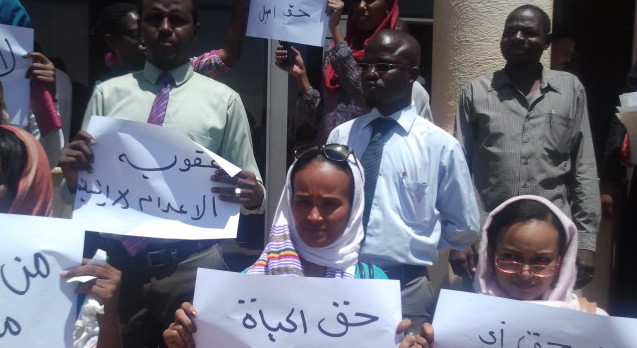Three times, the judge asked Mariam Yahya Ibrahim to recant her Christian faith and declare her belief in Islam. Three times, the pregnant 27-year old Sudanese mother refused.
Declaring her guilty of apostasy, Judge Maulana Abbas Mohammed Khalifa announced his sentence: death by hanging.
He gave Mariam 26 months to live, only enough time for her to give birth and then breastfeed her child for two years.
Mariam is appealing the ruling, but if the sentence stands she will be the first executed for apostasy by Sudan in nearly 20 years. Mahmoud Mohamed Taha, a 76 year-old engineer, was last executed in 1985. Since then, others have faced charges of apostasy, but all later recanted.
The court ruled Mariam violated article 126 of the 1991 Criminal Code, which states in part, “Whoever commits apostasy shall be asked to repent within a period decided by the court and if he insisted on his apostasy and was not a new convert he shall be punished with death.” Sudan implemented Shari’a law in the early 1980s.
Outside the courthouse, protesters faced off. “The Death Sentence is a Violation of Humanity,” read banners held by human rights and political activists, including protesters from Sudan Change Now and Grifna. “Get out, go to Europe and leave this country,” read an opposing banner. “God is great,” some shouted. “You can not change his law.”
Shari’a law is at the center of Sudan’s contentious political debate, and the current government’s interpretation of Shari’a is strongly cited by some rebel movements and political activists as a basis for their ongoing opposition to the Sudanese government. At issue is not just questions of religion, but overlapping issues of ethnicity and Sudanese identity. Most of the armed rebels come from minority communities who feel marginalized from the government leadership in Khartoum.
“In this decision we see just how precarious life is for non-Muslims in Sudan. Even if international outrage ultimately leads to her pardon, the message to non-Muslims is clear: You are not safe here,” said Rebecca Hamilton, a Columbia Law School professor and author of Fighting for Darfur.
In order to prove apostasy, the prosecution first had to convince the judge that Mariam came from a Muslim family. Mariam claims her mother was Ethiopian, and died several years ago. A woman in court testified as Mariam’s mother, but Mariam denied knowing her.
The judge said that official records show Mariam is from Gedaref State, born to a Muslim father, and that she moved to Khartoum and attended Sudan University of Science and Tech to be a lab technician. Mariam disputed this account, saying that she was born in Darfur and attended the University of Khartoum. The court found that the University of Khartoum did not have any records of her attendance.
Mariam’s alleged family filed a missing persons report with the police in 2012. They claim they later found her living in an uptown neighborhood in Khartoum, having married Daniel Wani, a Christian from South Sudan with US citizenship who works for the UN as a translator. According to the judge, when Mariam’s alleged relatives found her, she denied knowing them or sharing their Islamic faith. She had allegedly changed her name from Abrar to Mariam.
Mariam told the court a far different account of her life. Mariam said she was born a Christian in Darfur to an Ethiopian mother, who is now dead. A Comboni missionary testified he saw her attend church regularly in Khartoum since 2005. Mariam once disappeared for a while and explained she had to bury her mother, he said. She married in 2011 and later gave birth to a son, Martin Daniel.
The judge did not accept Maria’s account and concluded that since she is from a conservative Islamic family, she is subject to the state’s interpretation of Islamic law.
Lawyer Nabil Adib Abdalla, who is joining Mariam’s defense team, expressed confidence that she would win the appeal. “First, it was not ruled beyond a reasonable doubt that she is a Muslim,” he said.
Abdalla also argues that the sentencing is unconstitutional and violates a number of international human rights agreements. These include Article 18 of the Universal Declaration of Human Rights, and Article 8 of the African Charter on Human and Peoples’ Rights. Sudan is a signatory of both charters.
Abdalla said the defense will further make the case that the judge misinterpreted the Islamic law. The apostasy charge, he said, should only apply to those who willingly joined Islam and then left it, not to those who inherited the faith from their father but never practiced it as adults.
The introduction of Shari’a law in Sudan the early 1980s partly fueled Sudan’s long civil war. That war ended in a 2005 peace deal and led to the creation of South Sudan in 2011. President Omar al-Bashir vowed after the secession of South Sudan his government would enforce Shari’a law even more strictly.
Sudan is a majority Muslim country with a Christian minority population. As wars wage in South Kordofan, Darfur and Blue Nile, President Bashir has called for a national dialogue towards unity.
“There is a push for a dialogue. But as long as these laws remain,” Abdulla said “you never know what will happen.”





